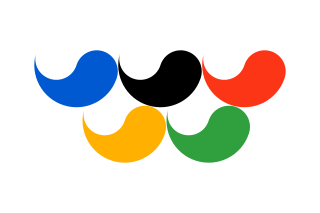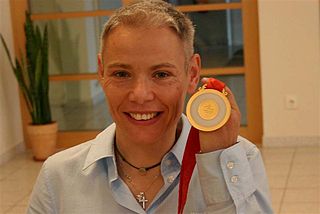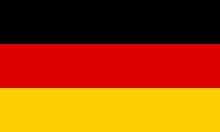
The 1992 Winter Paralympics were the fifth Winter Paralympics. They were the first Winter Paralympics to be celebrated with the International Olympic Committee cooperation. They were also the first ever Paralympics or a Winter Parasports event held in France. They were held at the resort of Tignes as a support venue of the main host city Albertville, France, from 25 March to 1 April 1992. For the first time, demonstration events in Alpine and Nordic Skiing for athletes with an intellectual disability and Biathlon for athletes with a visual impairment were held.

The 1992 Summer Paralympics were the ninth Paralympic Games to be held. They were held in Barcelona, Catalonia, Spain. In addition, the 1992 Paralympic Games for Persons with mental handicap were held immediately after the regular Paralympics in the Spanish capital, Madrid.

The 1988 Winter Paralympic Games were the fourth Winter Paralympics, held again in Innsbruck, Austria. These were the last Paralympics to be held in a separate location from the Olympics. Beginning in 1992, the Olympics and the Paralympics were held in the same city or in an adjacent city. These Paralympics were not held at the same Olympic venue in Calgary, Canada, because of financial and recruiting difficulties. A total of 377 athletes from 22 countries took part. The USSR competed for the first and only time. Sit-skiing was introduced as another event in both the Alpine and Nordic skiing competitions. Other sports were biathlon and ice sledge speed racing. Ice sledge speed racer Knut Lundstroem from Norway was the most successful athlete, winning four gold medals in the 100m, 500m, 1000m and 1500m events.
Frank Höfle is a disabled German biathlete and cross-country skier. He first participated in the Winter Paralympic Games in 1984 and won his first medal, a gold, in 1988. He has competed in every Winter Paralympics since then until 2010, winning a total of 21 medals, 13 of them gold. He has competed in cycling at the Summer Paralympics twice, in 1992 and 1996, and won an additional one gold and two bronze medals.

The Winter Paralympic Games is an international multi-sport event where athletes with physical disabilities compete in snow and ice sports. The event includes athletes with mobility impairments, amputations, blindness, and cerebral palsy. The Winter Paralympic Games are held every four years directly following the Winter Olympic Games and hosted in the same city. The International Paralympic Committee (IPC) oversees the Games. Medals are awarded in each event: with gold for first place, silver for second, and bronze for third, following the tradition that the Olympic Games began in 1904.

Below is an all-time medal table for all Paralympic Games from 1960 to 2024. The International Paralympic Committee does not publish all-time tables, and publishes unofficial tables only per single Games. This table was thus compiled by collating single entries from the IPC database. This medal table also includes medals won at the 1992 Summer Paralympics for Intellectually Disabled, held in Madrid, which also organized by the International Coordination Committee (ICC) and same Organizing Committee (COOB'92) that directed the 1992 Summer Paralympics held in Barcelona, however the results are not included in the International Paralympic Committee's (IPC) database.

Iraq made its Paralympic Games début at the 1992 Summer Paralympics in Barcelona. It has competed in every edition of the Summer Paralympics since then, but never in the Winter Paralympics. Iraqi Paralympians have won a total of 18 medals: three gold, seven silver and eight bronze.

Liechtenstein made its Paralympic Games début at the 1984 Summer Paralympics in Stoke Mandeville and New York City, entering just one athlete in athletics. The country competed again at the 1988 and 1992 Summer Games, and at the 1992 and 1994 Winter Games. It was then absent from the Paralympics until the 2004 Summer Games in Athens, where it sent just one table tennis player, Peter Frommelt. Liechtenstein was absent from the 2006 and 2010 Winter Games and the 2008 Summer Games.

Namibia made its Paralympic Games début at the 1992 Summer Paralympics in Barcelona. These were the first Summer Paralympics to be held since the country's accession to independence from South Africa in 1990, and thus the first Games in which Namibia was able to take part. For its inaugural participation, the country sent just two athletes, both women, who both competed in discus, javelin and shot put. They did not win any medals.

The Unified Team was the name used for the sports team of eleven former constituent republics of the Soviet Union (excluding Estonia, Georgia, Latvia, and Lithuania) at the 1992 Winter Paralympics in Albertville and the 1992 Summer Paralympics in Barcelona. The IOC country code was EUN, after the French name, Équipe Unifiée.

The Dominican Republic made its Paralympic Games début at the 1992 Summer Paralympics in Barcelona, with track and field athlete Rodolfo del Rosario as its sole representative. The country has competed in every subsequent edition of the Summer Paralympics, except 2000, but has never taken part in the Winter Paralympics. Dominican Republic delegations have never contained more than two competitors.

Panama made its Paralympic Games début at the 1992 Summer Paralympics in Barcelona, with a delegation of two competitors in athletics. It has participated in every subsequent edition of the Summer Paralympics, but never in the Winter Paralympics. Panamanian delegations have always been small, never consisting in more than two competitors.

Uruguay made its Paralympic Games début at the 1992 Summer Paralympics in Barcelona, sending just two representatives to compete in track and field. The country has competed in every subsequent edition of the Summer Paralympics, but never in the Winter Paralympics. Its delegations have always been small, never consisting in more than three competitors.

Germany (GER) participated in the inaugural Paralympic Games in 1960 in Rome, where it sent a delegation of nine athletes. The country, since 1949 officially the Federal Republic of Germany (FRG), was until 1990 also called West Germany while the separate East German Democratic Republic (GDR) existed, which was recognized by the IOC only after 1964. East German athletes, however, participated in the Paralympics for the first and last time in 1984. Following the reunification of Germany in 1990, athletes from all of Germany compete simply as Germany (GER) again.

Lithuania, following its independence from the Soviet Union, made its Paralympic Games début at the 1992 Summer Paralympics in Barcelona, with a delegation of four athletes in track and field. This first delegation was notably successful, with all four athletes winning at least one medal, and female runner Sigita Kriaučiūnienė sweeping up four medals. Kriaučiūnienė was also part of Lithuania's two person delegation for its first participation in the Winter Paralympics, in 1994. Lithuania has taken part in every subsequent edition of the Summer Paralympics, but has not returned to the Winter Games since 1994.

Martina Monika Willing is a Paralympic athlete from Germany competing in field events. She is both blind and paraplegic. Until 1994 she competed in the F11 classification for vision impaired athletes; following her paralysis, she returned to competition as a seated thrower. Willing has competed and medalled in eight Paralympic Games – all seven summer games from 1992 in Barcelona to 2016 in Rio as well as at the 1994 winter games in Lillehammer. Complications during knee surgery following a fall at the Lillehammer Paralympics led to her paralysis.

The Union of Serbia and Montenegro only competed at the Paralympic Games under that name at the 2004 Summer Paralympics in Athens. In 1992, its athletes competed as Independent Paralympic Participants. From 1996 to 2000, included, it was officially known as the Federal Republic of Yugoslavia. The International Paralympic Committee lists the country as "Yugoslavia" up to 2000, included, and considers that "Serbia and Montenegro" participated only in 2004. In 2006, the Union split into two sovereign countries, henceforth competing separately as Serbia and Montenegro.

Andrea Eskau is a German handbiker, Paralympic biathlon, and cross country skier who was born in Apolda and was a winner of three gold medals in Summer Paralympic Games.

Austria competed at the 1992 Winter Paralympics in Tignes/Albertville, France. 31 competitors from Austria won 20 medals including 8 gold, 3 silver and 9 bronze and finished 4th in the medal table.

Czechoslovakia competed at the 1992 Winter Paralympics in Tignes/Albertville, France. 16 competitors from Czechoslovakia won 6 medals, 4 silver and 2 bronze, and finished 14th in the medal table.


















